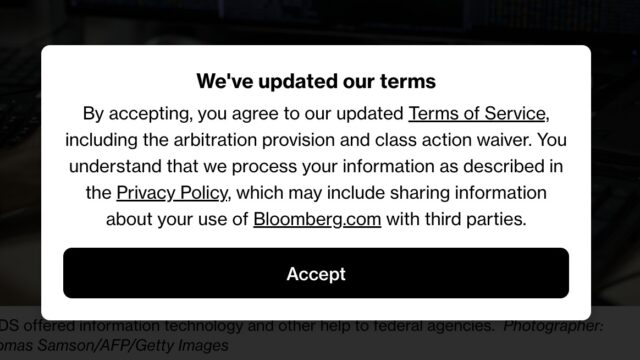While perfectly legal, it is remarkable that to read a Bloomberg article, you must first agree to binding arbitration and waive your class action rights.

I don’t often see dialog boxes like this one. In fact, if I go to the URL of a Bloomberg.com article, I don’t see any popups: nothing about privacy, nothing about cookies,
nothing about terms of service, nothing about only being allowed to read a limited number of articles without signing up an account. I just… get… the article.
The reason for this is, most-likely, because my web browser is configured, among other things, to:
- Block all third-party Javascript (thanks, uBlock Origin‘s “advanced mode”), except on domains where they’re explicitly allowed (and even then
with a few exceptions: thanks, Ghostery),
- Delete all cookies 30 seconds after I navigate away from a domain, except for domains that are explicitly greylisted/allowlisted (thanks, Cookie-AutoDelete), and
- Resist other fingerprinting methods as best I can (thanks, Enhanced Tracking
Protection).
But here’s the thing I’ve always wondered: if I don’t get to see a “do you accept our terms and conditions?” popup, is is still enforceable?
Obviously, one could argue that by using my browser in a non-standard configuration that explicitly results in the non-appearance of “consent” popups that I’m deliberately turning a
blind eye to the popups and accepting them by my continued use of their services. Like: if I pour a McDonalds coffee on my lap having
deliberately worn blinkers that prevent me reading the warning that it’s hot, it’s not McDonalds’ fault that I chose to ignore their helpful legally-recommended printed warning on the cup, right?
But I’d counter that if a site chooses to rely on Javascript hosted by a third party in order to ask for consent, but doesn’t rely on that same third-party in
order to provide the service upon which consent is predicated, then they’re setting themselves up to fail!
The very nature of the way the Internet works means that you simply can’t rely on the user successfully receiving content from a CDN. There are all kinds of reasons my browser might not
get the Javascript required to show the consent dialog, and many of them are completely outside of the visitor’s control: maybe there was a network fault, or CDN downtime, or my
browser’s JS engine was buggy, or I have a disability and the technologies I use to mitigate its impact on my Web browsing experience means that the dialog isn’t read out to me. In any
of these cases, a site visitor using an unmodified, vanilla, stock web browser might visit a Bloomberg article and read it without ever being asked to agree to their terms and
conditions.
Would that be enforceable? I hope you’ll agree that the answer is: no, obviously not!
It’s reasonably easy for a site to ensure that consent is obtained before providing services based on that consent. Simply do the processing server-side, ask for whatever
agreement you need, and only then provide services. Bloomberg, like many others, choose not to do this because… well, it’s probably a combination of developer laziness and
search engine optimisation. But my gut feeling says that if it came to court, any sensible judge would ask them to prove that the consent dialog was definitely viewed by
and clicked on by the user, and from the looks of things: that’s simply not something they’d be able to do!
tl;dr: if you want to fight with Bloomberg and don’t want to go through their arbitration, simply say you never saw or never agreed to their terms and conditions – they
can’t prove that you did, so they’re probably unenforceable (assuming you didn’t register for an account with them or anything, of course). This same recommendation applies to many,
many other websites.
